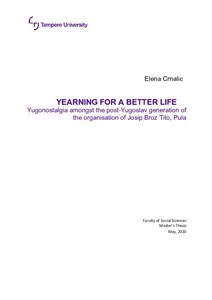Yearning for a better life: Yugonostalgia amongst the post-Yugoslav generation of the organisation of Josip Broz Tito, Pula
Crnalic, Elena (2020)
Crnalic, Elena
2020
Master's Degree Programme in Peace, Mediation and Conflict Research
Yhteiskuntatieteiden tiedekunta - Faculty of Social Sciences
This publication is copyrighted. You may download, display and print it for Your own personal use. Commercial use is prohibited.
Hyväksymispäivämäärä
2020-05-22
Julkaisun pysyvä osoite on
https://urn.fi/URN:NBN:fi:tuni-202005115188
https://urn.fi/URN:NBN:fi:tuni-202005115188
Tiivistelmä
The studies of nostalgia, especially nostalgia for socialism has continually been growing since the break-up of major Socialist powers in Europe. The abrupt transition from socialism to democracy, left many of its citizens yearning and remembering their own life under socialism, in turn, creating a post-socialist nostalgia. Yugonostalgia, known as nostalgia for the former Socialist Federal Republic of Yugoslavia, developed over the years, continually being present amongst the countries of former Yugoslavia, through art, pop culture, museums, relics and consumerism. Academic research on this topic continues to grow.
The aim of this study is to understand and explore the notion of Yugonostalgia amongst the post-Yugoslav generation in Croatia. The research combines collective memory, youth studies and peace and conflict research to gain an insight on the reasons for the presence of Yugonostalgia amongst the post-Yugoslav generation and what such can tell about the issues young people are facing in Croatia, as a post-conflict country.
The study group chosen for this research are the members of the organisation of Josip Broz Tito in Pula, Croatia. The organisation focuses primarily in keeping the memory of Yugoslavia and Josip Broz Tito alive. The group was chosen due to their knowledge and understanding of the notion of Yugonostalgia, Yugoslavia and Josip Broz Tito. Five (5) members of the organisation were selected and interviewed using qualitative semi-structured interviews. The data collected was transcribed and analysed through thematic analysis.
Even though not explicitly mentioned, the data showcased a presence of Yugonostalgia amongst the participants. Participants saw the worker’s rights, youth socialisation and the freedom of speech, amongst others, to have had more importance in Yugoslavia. The role of family and close social circles in learning about Yugoslavia was proven to be of great importance, which has allowed the participants to compare the past to the preset, in turn, labelling the life under Yugoslavia as of ‘better’ quality. The nostalgia for the past revealed the fear of the future and the mistrust in the current governing body in Croatia.
Academic literature and the results of this study potentially point out to the ongoing feelings of Yugonostalgia amongst the youth of the organisation of Josip Broz Tito, which has in turn, showcased the ongoing issues Croatia is facing as a post-conflict state, 25 years after the end of the conflict. In order to gain a better insight on the issues of youth in Croatia, as well as the presence of Yugonostalgia, further research with a larger sample size would be needed.
The aim of this study is to understand and explore the notion of Yugonostalgia amongst the post-Yugoslav generation in Croatia. The research combines collective memory, youth studies and peace and conflict research to gain an insight on the reasons for the presence of Yugonostalgia amongst the post-Yugoslav generation and what such can tell about the issues young people are facing in Croatia, as a post-conflict country.
The study group chosen for this research are the members of the organisation of Josip Broz Tito in Pula, Croatia. The organisation focuses primarily in keeping the memory of Yugoslavia and Josip Broz Tito alive. The group was chosen due to their knowledge and understanding of the notion of Yugonostalgia, Yugoslavia and Josip Broz Tito. Five (5) members of the organisation were selected and interviewed using qualitative semi-structured interviews. The data collected was transcribed and analysed through thematic analysis.
Even though not explicitly mentioned, the data showcased a presence of Yugonostalgia amongst the participants. Participants saw the worker’s rights, youth socialisation and the freedom of speech, amongst others, to have had more importance in Yugoslavia. The role of family and close social circles in learning about Yugoslavia was proven to be of great importance, which has allowed the participants to compare the past to the preset, in turn, labelling the life under Yugoslavia as of ‘better’ quality. The nostalgia for the past revealed the fear of the future and the mistrust in the current governing body in Croatia.
Academic literature and the results of this study potentially point out to the ongoing feelings of Yugonostalgia amongst the youth of the organisation of Josip Broz Tito, which has in turn, showcased the ongoing issues Croatia is facing as a post-conflict state, 25 years after the end of the conflict. In order to gain a better insight on the issues of youth in Croatia, as well as the presence of Yugonostalgia, further research with a larger sample size would be needed.
